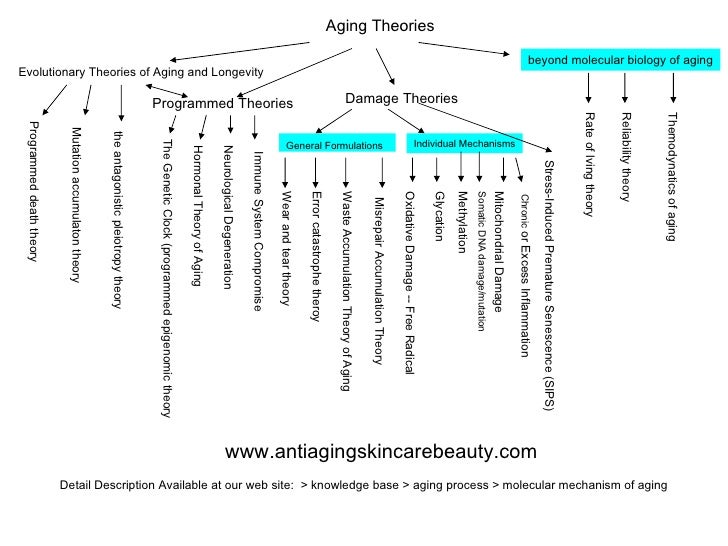Theories Of Aging
Successful ageing was to be achieved variously by remain. Ageing or aging see spelling differences is the process of becoming olderThe term refers especially to humans many other animals and fungi whereas for example bacteria perennial plants and some simple animals are potentially biologically immortal.

Pin By Gerontology On Theories Of Aging Theories Of Aging Molecular Methylation
Hormesis is a phenomenon in which low doses of stressors that are normally toxic instead strengthen an organism and make it more resistant to higher doses of the same toxin or stressor.

Theories of aging
. When enough cells are damaged overall functioning of the body is decreased. There have been many theories of aging over the centuries. One way of understanding variations in biological aging is to examine the major theories to explain cellular- and organ-level alterations which can only be inferred from tests of physiological function.Gene Theory which considers aging to be the result of a sequential switching on and off of certain genes with senescence being defined as the time when age-associated deficits are manifested. The free radical theory The crosslink or connective tissue theory Clinker theory The wear and tear theory. DEVELOPMENTAL GENETIC THEORY 2.
Current modified versions of aging theories have been introduced that involve the immune system the neuroendocrine system failures in DNA repair mutation of cells errors in proteins and damage from free radicals 7. It was further developed by one of us JM in what has become known as the mitochondrial theory of ageing. Theories of Aging.
Theories of aging have been debated since the time of the ancient Greeks. The ancient Greek Galen of Pergamum who served as official court physician to Roman Emperor Marcus Aurelius believed aging was a loss of two of the four bodily humors heat and moisture over time. The early theories of ageing were very proscribed and prescriptive as to how individuals should age.
The free radical theory of ageing is one of the most prominent and well studied. This decline is linked to excess of the stress hormone cortisol. These theories provide new experimental approaches to further develop our understanding of the phenomenon of ageing.
Theories of Aging Those who succeed at this final task also develop wisdom which includes accepting without major regrets the life that one has lived as well as the inescapability of death. One of the earliest theories of aging the wear-and-tear theory proposes that cell errors are the result of wearing out over time because of continued use. The philosopher Maimonides thought that precautions and careful living might prolong life.
These theories have important implications for understanding family dynamics and structure. In the twelfth century thoughts were centered on predetermination and an unalterable plan for life and death. CELLULAR THEORIES The cellular theories propose that aging is a process that occurs because of cell damage.
More recently Erasmus Darwin grandfather of Charles suggested a theory that aging was. There are three main disciplinarybased areas of aging theory. Cells are aggravated by the harmful effects of internal and external stressors which include pollutants and injurious metabolic by-products now known as free radicals.
However even older adults who achieve a high degree of integrity may feel some despair at this stage as they contemplate their past. And scientific discoveries of the cause of a physiological process or disease can in some instances point to ways to prevent it. Hormesis is not a theory of aging but it has huge implications for other theories.
Everyone wants to age well. Furthermore ageing connotes a biological and social construct. Autoimmune Theory which states that the immune system is programmed to decline over time leading to an increased vulnerability to infectious disease and thus ageing and death.
I mean we all want the freedom to be crotchety old people yelling at young whippersnappers on our lawn. Biological psychological and social. The most widely accepted overall theory of aging is the evolutionary senescence theory of aging.
Two major aging theories have evolved from those studies. It is usually associated with dynamic changes in the biological. However theorists have increasingly been developing and implementing more interdisciplinary theories such as the convoy theory of social support.
Unlike the earlier programmed theory of evolution and aging which tried to findreasonswhyevolutionmightfavor aging evolutionary senes-cence theory focuses on the failure of natural selection to affect late-life traits. Hormonal Stress Theory also known as Neuroendocrine Theory of Aging suggests that as we age the ability of the hypothalamus to regulate hormones in the body begins to decline leading to metabolic problems American Federation of Aging Research AFAR 2011.

Pin By Gerontology On Theories Of Aging Systems Theory Theories Of Aging Immune System

Theories Of Aging Theories Of Aging Nursing Theory Aging

Sociological Theories Of Aging 1 Theories Of Aging Theories Aging

Theories Of Aging Theories Of Aging Spiritual Needs Social Behavior

Theories Of Aging Theories Of Aging Physical Stress Stress Causes

Theories Of Aging Theories Of Aging Theories Spiritual Needs

Theories Of Aging Theories Of Aging Theories Spiritual Needs

Sociological Theories Of Aging Lecture 7 Chapter 9 Theories Of Aging Aging Theories
Post a Comment for "Theories Of Aging"